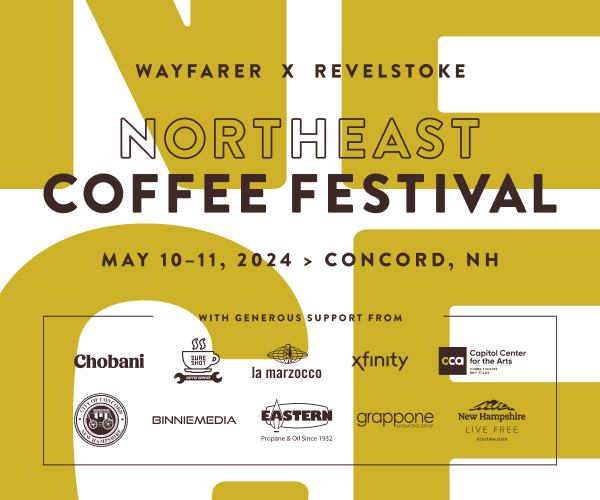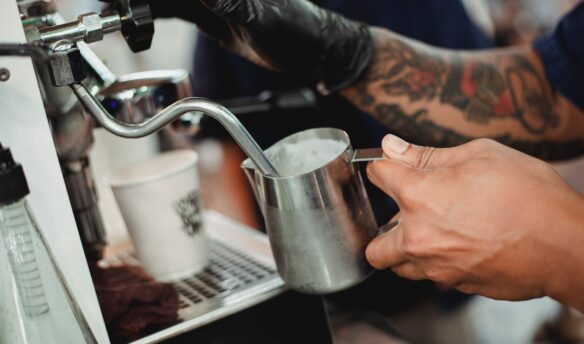[R]ichwood Bank offers all of the standard financial services: savings and checking accounts, mortgages, auto loans, and insurance products. Thanks to the advent of mobile banking, which makes it possible to deposit a check with a photo, fewer customers were going to the Richwood, Ohio bank to do their banking.
“A lot of other banks do what we do; how do we differentiate ourselves?” asks Richwood Bank president and CEO Chad Hoffman. “Checking and savings accounts are not enough; we needed to figure out a new model or we’d disappear.”
To bring in business, Hoffman pitched his board of directors a radical idea: open a coffee shop in the lobby. He reasoned that a café would draw people into the bank and entice them to do business on-site. Hoffman got approval for the project and Richwood Coffee opened in 2015.
Richwood Bank isn’t the only financial institution banking on coffee. Several major financial institutions, community banks, and credit unions are offering lattes with loan applications.
Capital One operates nineteen Capital One Cafés; ING Direct opened cafés in its Paris and Lyon, France branches, and First Bank and Trust in Sioux Falls, South Dakota, is opening a hybrid location with local coffee shop Coffea Roasterie later this year.
Most of these cafés offer banking services with coffee shop perks like fresh-brewed beverages, free Wi-Fi, and lounge seating. Capital One describes their cafés as “hubs that serve as spaces for local residents to learn about their finances, but also to eat, work, and meet.” The combination of bankers and baristas help attract new business and build customer loyalty.
Richwood Coffee served up 4,500 cups of java to the local population of 2,000 in November. In the bank, where transaction volume declined 10 percent from 2013 to 2015, transactions increased 12 percent after the café opened.
The addition of an on-site coffee shop has been so successful that the board approved coffee shops in two more bank branches: Richwood Bank will open coffee shops in its Delaware and Marysville, Ohio branches this year.
“The number of people who are walking in the door and experiencing us has skyrocketed,” Hoffman says.
Despite the success, launching a bank café is complex.
The Federal Reserve prohibits banks from engaging in commerce, which makes selling coffee illegal.
To comply with federal regulations while still bringing in customers, Richwood Bank hired three baristas to operate Richwood Coffee and “sell” coffee on a donation basis. Customers purchase punch cards from tellers and allocate their coffee fees to one of four local charities. Hoffman calls the setup a home run: the bank donates to local nonprofits, earns the goodwill of its neighbors, and brings in business.
“We believe in building community in creative ways and the coffee shop is a huge part of that,” Hoffman says. “It’s helping keep the community banking model relevant.”
For Dubuque, Iowa, credit union IntegrUS, the regulations proved too challenging to overcome.
In 2014, IngetrUS opened Caisse Café in its newest branch. To comply with federal banking regulations, the credit union charged just seventy-five cents for a sixteen-ounce cup of coffee and a dollar for a cappuccino or hot chocolate—enough to cover their costs but not a cent more. Tellers doubled as baristas, brewing and serving beverages.
CEO Jonathan Miller admits that the setup was not ideal.
“People were expecting Starbucks and we were serving the same coffee as the local convenience store for the same prices as McDonald’s,” Miller says. “The concept was not catching on.”
IntegrUS tried partnering with a local coffee shop to take over operations of Caisse Café but regulators prohibited the nonprofit credit union from installing a for-profit business on the premises. For now, the credit union offers coffee free of charge to customers and there is a small but loyal customer base.
“It’s still a good venue to bring people in and interact with our current members,” says Miller.
It’s hard to see banks becoming the next destination for freelancers and the growing remote workforce, but with the right (and federal regulation-compliant) setup, a café in a financial institution can be an effective way for the bank to connect with customers and entice them to do their banking in-house.
—Jodi Helmer is a North Carolina–based freelancer who writes about the intersection between food, farming, and business.
















